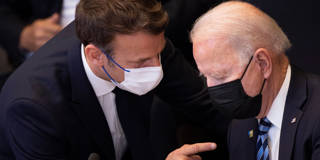The transatlantic alliance is enjoying a period of restoration following the damage done by former US President Donald Trump. But as the West’s messy exit from Afghanistan has made clear, the United States and its European allies must undertake determined efforts to prepare for the formidable challenges it now faces.
FRANKFURT/WASHINGTON, DC – Transatlantic relations rebounded buoyantly after US President Joe Biden arrived in the Oval Office. But the Taliban’s rapid takeover in Afghanistan and the chaotic evacuation of foreign nationals and at-risk Afghans has soured the mood. European disquiet over Biden’s handling of the Afghan withdrawal, alongside Germany’s forthcoming federal election on September 26, makes this an opportune moment to take stock of the Atlantic alliance.
Four fundamental geopolitical changes are reshaping transatlantic relations. First, although the transatlantic link survived Donald Trump, his presidency (and near re-election), coupled with the illiberal populism that also infects Europe, has exposed the fragility of liberal democracy in its historical bastions. This internal menace, rather than China, Russia, or violent extremism, may pose the greatest threat to the transatlantic community today.
Second, even though Biden’s election has reinvigorated Atlanticism, the domestic foundations of US internationalism have weakened considerably. NATO allies perceive the United States’ too-hasty withdrawal from Afghanistan as a worrying sign that Biden’s “foreign policy for the middle class” means a focus on the home front and a continuing US retrenchment in the broader Middle East. Moreover, America’s strategic preoccupation with China could mean less US attention and resources for Europe, and imply an expectation that Europeans will do more to provide for their own security.

FRANKFURT/WASHINGTON, DC – Transatlantic relations rebounded buoyantly after US President Joe Biden arrived in the Oval Office. But the Taliban’s rapid takeover in Afghanistan and the chaotic evacuation of foreign nationals and at-risk Afghans has soured the mood. European disquiet over Biden’s handling of the Afghan withdrawal, alongside Germany’s forthcoming federal election on September 26, makes this an opportune moment to take stock of the Atlantic alliance.
Four fundamental geopolitical changes are reshaping transatlantic relations. First, although the transatlantic link survived Donald Trump, his presidency (and near re-election), coupled with the illiberal populism that also infects Europe, has exposed the fragility of liberal democracy in its historical bastions. This internal menace, rather than China, Russia, or violent extremism, may pose the greatest threat to the transatlantic community today.
Second, even though Biden’s election has reinvigorated Atlanticism, the domestic foundations of US internationalism have weakened considerably. NATO allies perceive the United States’ too-hasty withdrawal from Afghanistan as a worrying sign that Biden’s “foreign policy for the middle class” means a focus on the home front and a continuing US retrenchment in the broader Middle East. Moreover, America’s strategic preoccupation with China could mean less US attention and resources for Europe, and imply an expectation that Europeans will do more to provide for their own security.